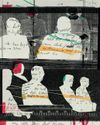
The new film from Sofia Coppola, “Priscilla,” begins in 1959. Sitting at the counter of a diner at a U.S. Army base in Germany, Priscilla Beaulieu (Cailee Spaeny) is asked whether she likes Elvis Presley. She answers with a question: “Of course, who doesn’t?” Priscilla is petite, polite, and fourteen—a little older than Juliet was when she first bumped into Romeo. The exciting, if alarming, news is that Elvis, the most unattainable of stars, has swung into her orbit. He’s currently stationed nearby, serving in the military, and Priscilla is invited to meet him at a party. Romeo is right there in the room. “You’re just a baby,” Elvis tells her. “Thanks,” she replies.
Elvis is played by Jacob Elordi, who, by my estimate, is about three times taller than his co-star. As a result, the rapport between Elvis and Priscilla appears to be powered less by loving hearts than by simple hydraulics; he has to lean over and down as if hinged, like an industrial crane, for a word in her ear. (Later in the movie, she acquires a towering beehive, but that doesn’t really solve the problem. “Talk to the hair” is not something you say to Elvis Presley.) Nonetheless, the two of them fuse, sharing pangs of homesickness, and it’s not long before Elvis is introduced to Priscilla’s mother, Ann (Dagmara Dominczyk), and stepfather, Paul (Ari Cohen). “I happen to be very fond of your daughter,” Elvis reassures them. When he takes her out for the evening, Paul—a captain, and therefore Elvis’s superior in rank—commands him to “bring her home by 2200.” This is the Army, son.
This story is from the {{IssueName}} edition of {{MagazineName}}.
Start your 7-day Magzter GOLD free trial to access thousands of curated premium stories, and 9,000+ magazines and newspapers.
Already a subscriber ? Sign In
This story is from the {{IssueName}} edition of {{MagazineName}}.
Start your 7-day Magzter GOLD free trial to access thousands of curated premium stories, and 9,000+ magazines and newspapers.
Already a subscriber? Sign In

GET IT TOGETHER
In the beginning was the mob, and the mob was bad. In Gibbon’s 1776 “Decline and Fall of the Roman Empire,” the Roman mob makes regular appearances, usually at the instigation of a demagogue, loudly demanding to be placated with free food and entertainment (“bread and circuses”), and, though they don’t get to rule, they sometimes get to choose who will.

GAINING CONTROL
The frenemies who fought to bring contraception to this country.

REBELS WITH A CAUSE
In the new FX/Hulu series “Say Nothing,” life as an armed revolutionary during the Troubles has—at least at first—an air of glamour.

AGAINST THE CURRENT
\"Give Me Carmelita Tropicana!,\" at Soho Rep, and \"Gatz,\" at the Public.

METAMORPHOSIS
The director Marielle Heller explores the feral side of child rearing.

THE BIG SPIN
A district attorney's office investigates how its prosecutors picked death-penalty juries.

THIS ELECTION JUST PROVES WHAT I ALREADY BELIEVED
I hate to say I told you so, but here we are. Kamala Harris’s loss will go down in history as a catastrophe that could have easily been avoided if more people had thought whatever I happen to think.

HOLD YOUR TONGUE
Can the world's most populous country protect its languages?

A LONG WAY HOME
Ordinarily, I hate staying at someone's house, but when Hugh and I visited his friend Mary in Maine we had no other choice.

YULE RULES
“Christmas Eve in Miller’s Point.”